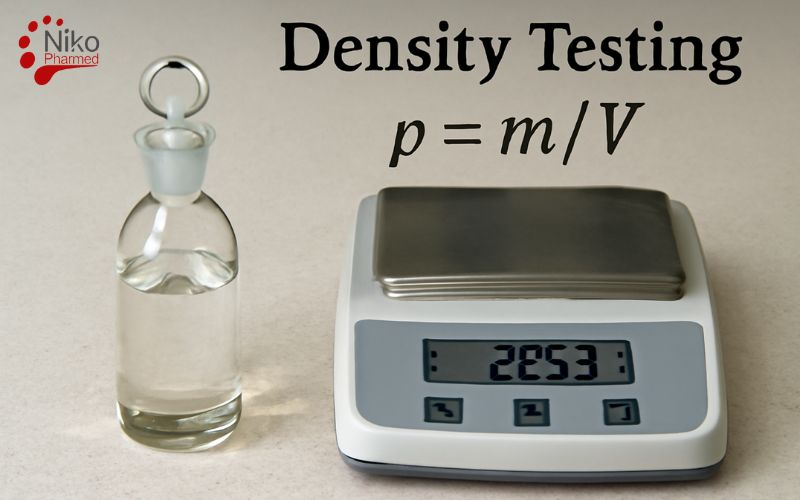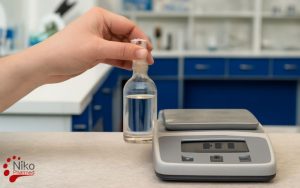What is Density Testing?
Density testing is a precise analytical procedure used to quantify the mass per unit volume of a substance, a property known as density (ρ). Density is expressed as the ratio of mass (m) to volume (V), i.e., ρ = m/V, and is typically measured in units such as grams per cubic centimeter (g/cm³) for solids and liquids, or kilograms per liter (kg/L) for liquids.
The technique relies on determining either the mass of a known volume or the volume of a known mass using standardized methods such as the displacement method for irregular solids, pycnometry for liquids, or hydrometric techniques for determining liquid density.
Density testing plays a critical role in material identification, purity assessment, and quality control, as changes in density can indicate variations in composition or structure. It is also a key tool in various fields, including chemistry, physics, pharmaceuticals, and material science, where precise density measurements are crucial for understanding physical properties, behaviors, and interactions of substances.
Density (ρ\rhoρ) is defined as the mass of a substance per unit volume, mathematically expressed as: ρ=Vm
Where:
- ρ\rhoρ = Density of the substance (usually expressed in g/cm³ or kg/m³)
- mmm = Mass of the substance (measured in grams or kilograms)
- VVV = Volume of the substance (measured in cubic centimeters or cubic meters)
Density Testing Procedure
The density testing procedure is carried out using a variety of techniques, depending on the physical state (solid, liquid, or gas) of the substance being measured. The most commonly employed methods are outlined below:
Density Testing For Solids
Method: Archimedes’ Principle (for irregular solids)
Preparation of Equipment: A balance for measuring mass (to a precise degree) and a graduated cylinder or volumetric flask for displacement of liquid.
Weighing the Sample: Weigh the solid sample accurately using an analytical balance.
Measuring Volume: To determine the volume of an irregular solid, submerge it in a liquid (often water) of known density. Record the volume displacement in the graduated cylinder.
Calculation: The volume of the solid is equivalent to the volume of the liquid displaced. Use the formula for density:
ρ=Vm
Where mmm is the mass and VVV is the displaced volume.
Method: Geometric Calculation (for regular solids)
Measurement of Dimensions: For regular solids (e.g., cubes, spheres), measure the precise dimensions using calipers or other measuring instruments.
Volume Calculation: Use the appropriate geometric formula (e.g., volume of a cube V=a3V = a^3V=a3, or volume of a sphere V=4/3πr3 to calculate the volume.
Density Calculation: Calculate density using the mass obtained from the balance and the calculated volume.
Density Testing For Liquids
For liquid products such as beverages, pharmaceuticals, and industrial formulations, density measurements are often interpreted together with viscosity testing to understand both flow behavior and mass per unit volume
Method: Liquid Displacement (for liquids in a known container)
Preparation of Equipment: A pycnometer (for precise measurements) or a graduated cylinder is used to measure the volume of the liquid. A balance is required for mass measurement.
Weighing the Liquid: First, weigh the container (e.g., a clean and dry pycnometer or graduated cylinder).
Adding the Liquid: Add a known volume of liquid to the container.
Weighing the Filled Container: Weigh the container with the liquid.
Calculating Density: The mass of the liquid is the difference between the mass of the container with liquid and the mass of the empty container. The density of the liquid is calculated as:
ρliquid=Mliquid/Vliquid
Where mliquidm is the mass of the liquid, and VliquidV is the known volume of the container.
Density Testing For Gases
Method: Ideal Gas Law (for gases in controlled conditions)
Preparation of Equipment: A sealed container (such as a gas syringe or a flask) and a pressure gauge, thermometer, and balance.
Measurement of Conditions: Record the temperature (TTT), pressure (PPP), and volume (VVV) of the gas sample.
Using the Ideal Gas Law: Apply the ideal gas law PV=nRTPV = nRTPV=nRT, where:
- PPP = Pressure of the gas
- VVV = Volume of the gas
- nnn = Number of moles of the gas
- RRR = Ideal gas constant
- TTT = Temperature in Kelvin
Calculation: The molar mass of the gas can be determined from the mass (mmm) and the number of moles (nnn), and from this, the density of the gas can be calculated using the relation: ρgas=Vm
Factors Affecting Density Testing
Temperature: Density is temperature-dependent; for most substances, density decreases as temperature increases due to expansion.
Purity of the Sample: Impurities or mixed substances can affect the measured density, so it is essential to use pure substances or account for impurities.
Precision of Instruments: Accurate balances, volumetric devices, and temperature-control equipment are critical for precise density measurement.
Standard References and Compliance
In professional settings, density testing procedures often comply with recognized standards to ensure uniformity and accuracy. Some common standards include:
ASTM D4052: Standard test method for density and relative density of liquids by digital density meter.
ISO 1183-1: Methods for determining the density of plastics.
ASTM D623-11: Standard method for density and relative density of nonvolatile liquids.
Summary of Standard Procedure
Prepare the sample (solid, liquid, or gas).
Choose the appropriate method based on the state of the sample.
Perform the density measurement using the correct equipment (balance, graduated cylinder, pycnometer, etc.).
Apply the formula for density to obtain the result, taking into account the conditions of temperature, pressure, and sample purity.
Record results accurately and confirm that the measurement adheres to standardized methods for quality assurance.
Density testing is a vital process in chemistry that involves precise measurement of mass and volume under controlled conditions. Standard procedures, as outlined, ensure reliable and reproducible results, critical for various applications in scientific research, industry, and quality control.
Nikopharmad Density Testing Laboratory
Accreditation and Global Recognition
At Nikopharmad, our Density Testing services are supported by ISO/IEC 17025 certification and ILAC accreditation, ensuring full compliance with internationally recognized standards of analytical quality and technical competence. These prestigious credentials confirm that our density testing data meet the highest global regulatory requirements, accepted by health authorities and regulatory bodies worldwide.
Technical Excellence and Validated Infrastructure
Our state-of-the-art laboratory is equipped with advanced, precision-controlled instruments, including calibrated densitometers and pycnometers. We adhere to validated methodologies, such as ASTM D1298, ISO 12185, and other industry standards, to deliver reliable and reproducible density measurements. With precise temperature control and standardized calibration protocols, our testing procedures ensure accurate density results for a wide range of samples, from pharmaceuticals to industrial liquids and gases.
Regulatory-Ready Reporting and Timely Results
In the fast-paced regulatory environment, timely and reliable results are essential. Nikopharmad ensures the rapid delivery of density testing results without compromising accuracy. Our streamlined process and comprehensive quality assurance protocols provide complete documentation with traceable raw data, statistical analysis, and regulatory submission-ready final reports. Our testing results are suitable for FDA, EMA, and other global regulatory filings, ensuring your data aligns with international standards.
Confidentiality and Data Integrity
At Nikopharmad, client confidentiality and data security are paramount. All density testing is conducted under strict confidentiality agreements and supported by 21 CFR Part 11-compliant electronic data systems. Our protocols ensure the integrity of all test data, with a complete audit trail and ethical handling of test materials. We uphold the highest standards of data protection, ensuring your sensitive information remains secure throughout the testing process.
Competitive Pricing with Uncompromised Quality
We understand the importance of cost-effective testing in product development. Nikopharmad offers competitive pricing for density testing services, tailored to meet the needs of startups, SMEs, and multinational companies. Our pricing model is designed to support your regulatory goals, helping to accelerate product approval timelines while maintaining the highest standards of accuracy and compliance.
To request testing or a complimentary consultation contact Nikopharmad
Partner with Nikopharmad for Expert Density Testing
By choosing Nikopharmad for your density testing needs, you align with a globally accredited laboratory committed to scientific excellence, regulatory compliance, and client confidentiality. Whether you are testing industrial liquids, pharmaceutical formulations, food products, or other substances, our density testing expertise ensures fast, reliable, and internationally recognized results—making us the ideal partner for developers seeking efficient and compliant market access.


